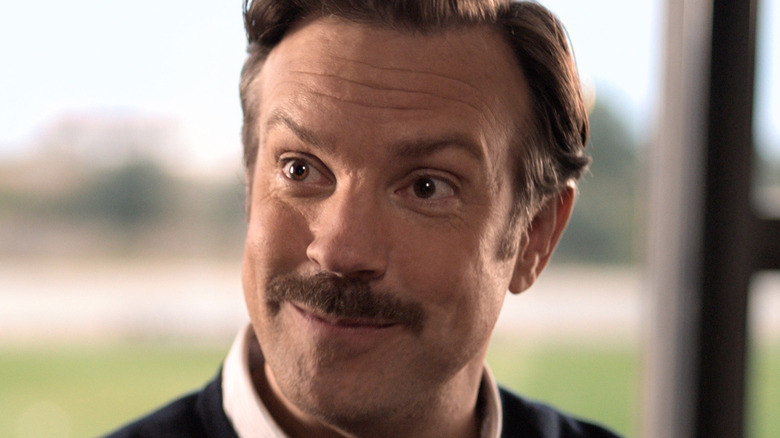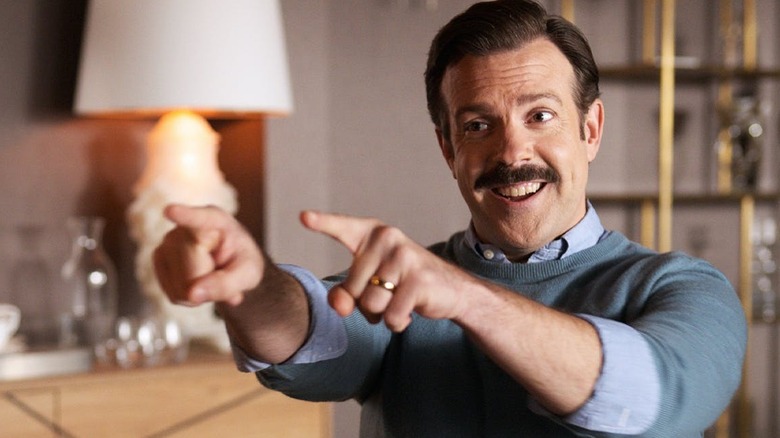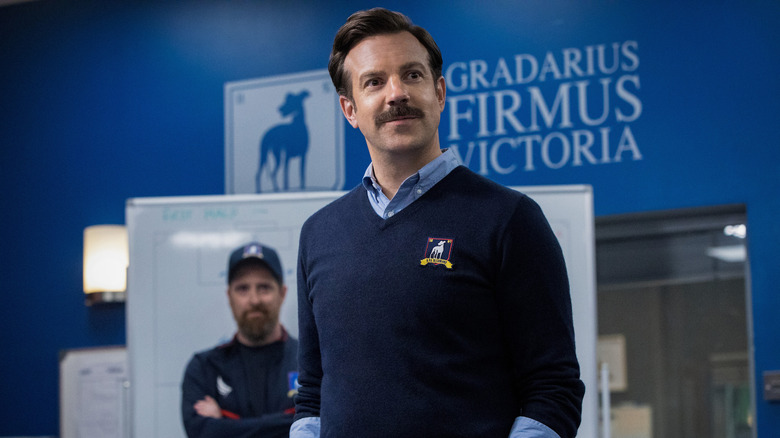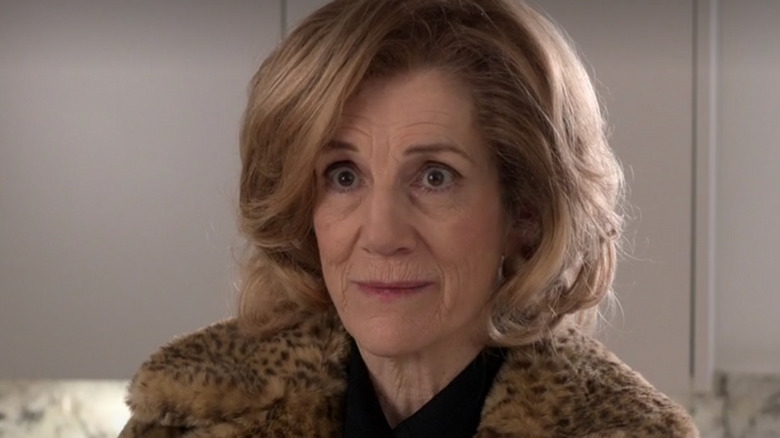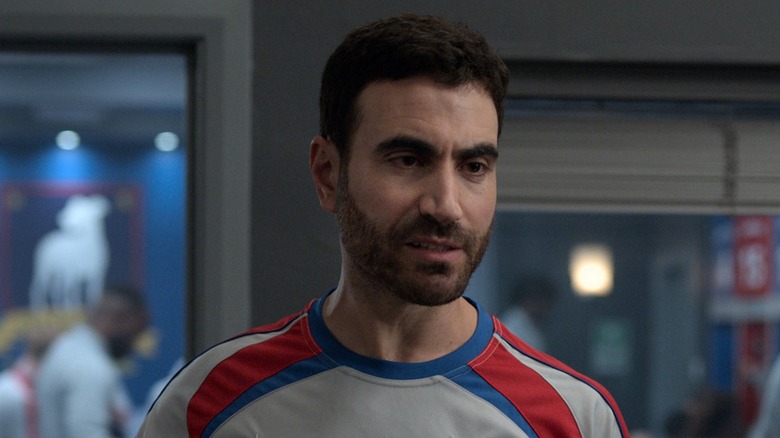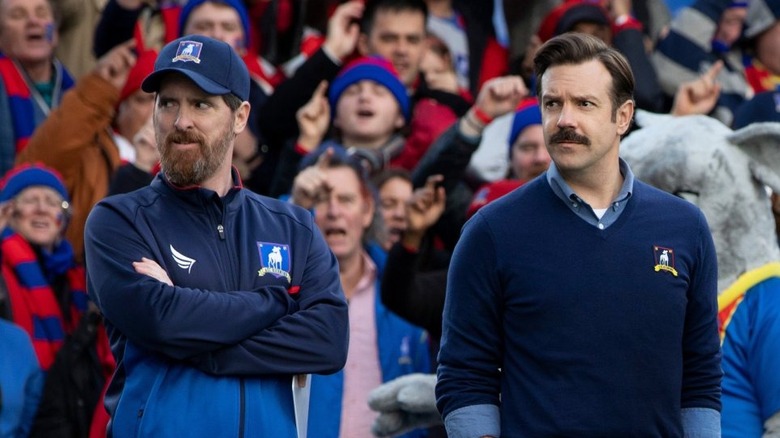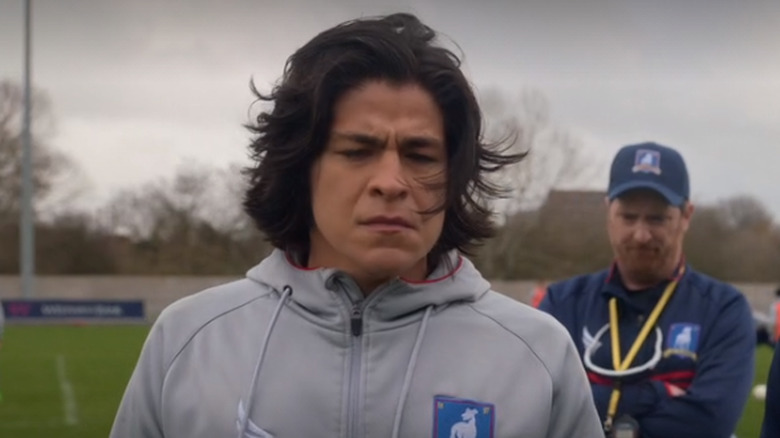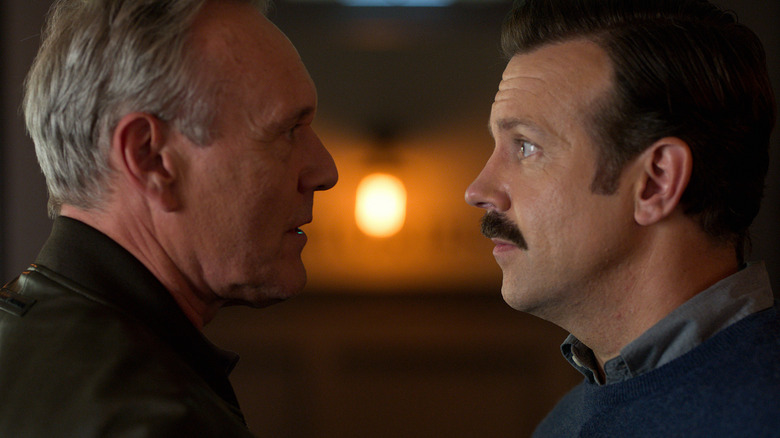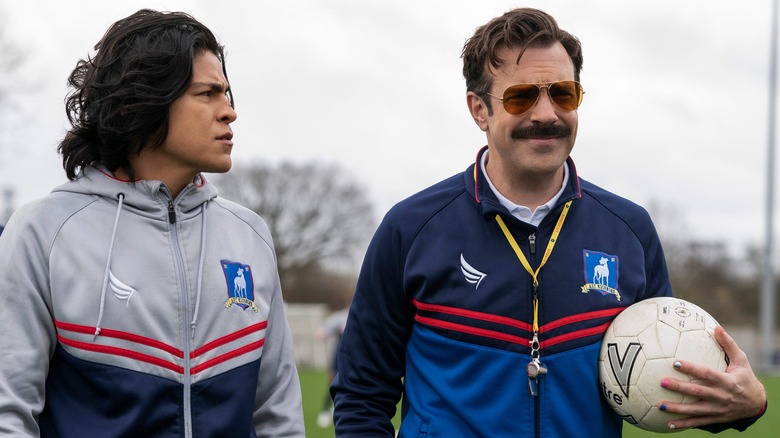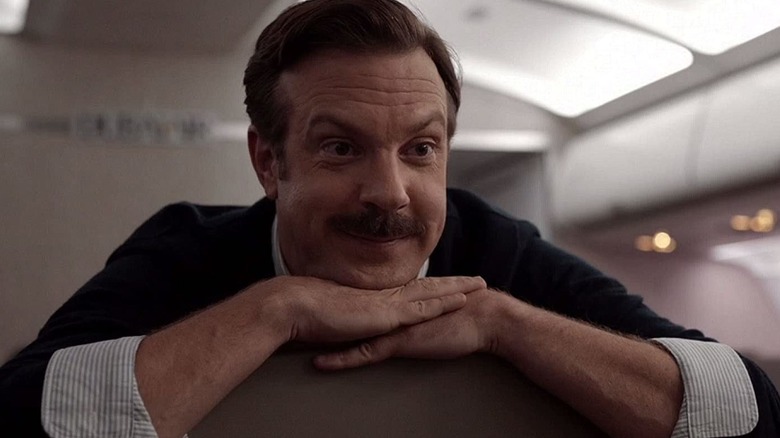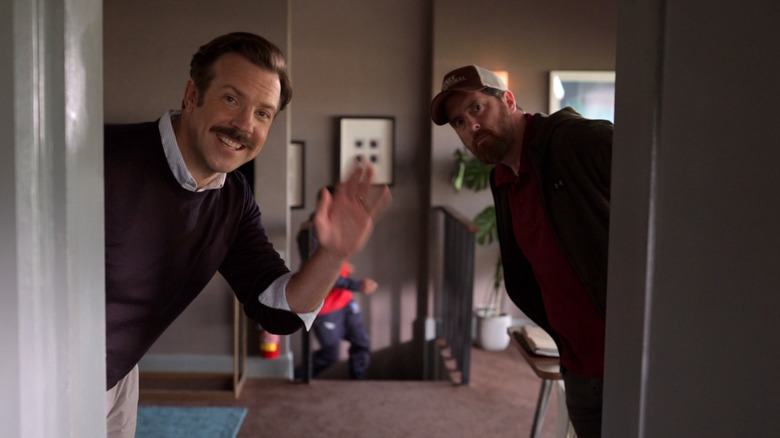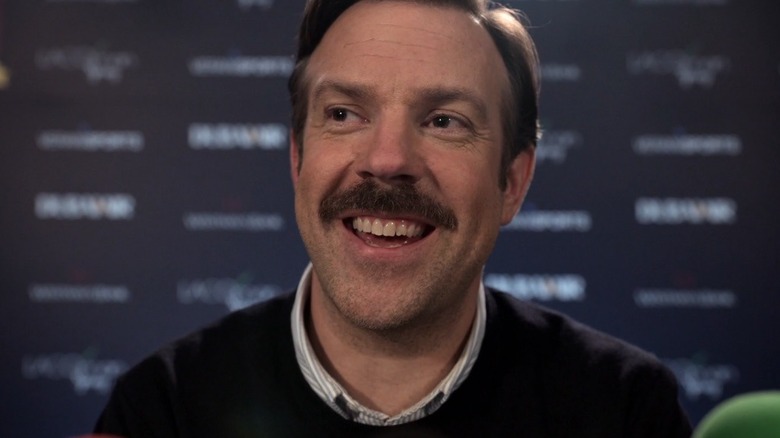Ted Lasso's Most Inspirational Quotes
The multiple-Emmy-nominated sitcom "Ted Lasso," about a U.S. Collegiate football coach who is brought to the U.K. to coach a soccer/football team (despite not knowing anything about the U.K., soccer, or ... any of it really) is a heartwarming fish-out-of-water story made all the more delightful by the general disposition of the title character, played by Jason Sudeikis. To a fault, he's an eternally optimistic, supportive, egoless bastion of goodwill and positive energy. His positivity is so infectious it turns nearly everyone in his favor, from the initially critical reporter Trent Crimm of The Independent to team owner Rebecca Welton (Hannah Waddingham), who brought Ted over to tank the team as a petty move to hurt her jerk ex-husband.
Part of this wellspring of positivity and charm is Ted's humorous, pithy, and winning way of speaking. He doesn't lecture, he disarms with funny, whimsical speech that often contains memorable words of wisdom. In fact, Ted's phrases are so ingrained in his character that the short video introducing his character on the show's Apple TV+ page highlights the word "Tedaphor," an original term meaning "a figure of speech in which one understood concept is compared to another; often humorous." Here is a list of Ted Lasso's most inspirational quotes.
12. Ted is a Rom-Communist
Sometimes all you need is just a little perspective, and as a coach giving perspective is Ted's modus operandi. In Season 2, Episode 5 ("Rainbow"), the team is still struggling. They lose yet another match, and while watching replays the team has resorted to blaming each other for their collective failures. Ted tells Coach Beard (Brendan Hunt) to hit pause and stands up to give the team one of his characteristic pep talks. He starts out by noting that some say there's something wrong with the team, though he disagrees. He says they're wrong because he believes in "Communism ... Rom-Communism, that is":
"Gentlemen, believing in rom-communism is all about believing that everything's gonna work out in the end. Now, these next few months might be tricky, but that's just 'cause we're going through the dark forest. Fairy tales do not start, nor do they end, in the dark forest."
The insight to this last point is quite deep. Lasso is expressing a fundamental philosophy that while things may look dark and treacherous ahead, he's confident the end will be good. It's an excellent metaphor for going through difficult, challenging, hard times — all worthy journeys have a dark forest moment, but few end there (at least to Ted). He's obviously not thinking of the fairy tales by the Brothers Grimm, but overall it is an apt metaphor that reminds us to persevere, see things through to the end, and await the hope on the other side.
11. It's not whether you win or lose, it's being your best self
For Ted Lasso the goal of coaching is about more than winning at all costs. Instead, his philosophy is more wide-ranging — he cares about players as people and in the totality of their lives as people. It's the trait he showed to Jamie Tartt when he saw him getting berated by his father for passing the ball, and it's the trait he summarized in the series' second episode, "Biscuits":
"For me, success is not about the wins and losses. It's about helping these young fellas be the best versions of themselves on and off the field."
It's a philosophy that he exhibits regularly. More essentially, it's an important one to learn from when you're responsible for others — as a parent, a mentor, or a coach. Ted exhibits this the entire series. He cares about what the players are going through off the field, at home, in their personal lives; he cares about how they're feeling. It's a great way to approach those whom you have to teach, either formally or in life, and a wonderful summation of that principle in one simple quote.
10. Ted has insight into parents and baggage
In Season 2, Episode 6, "The Signal," Ted is forced to alter his plans when Rebecca's mom comes by on an unannounced visit with news that she has left Rebecca's dad. It's a bit of a surprise (and interrupts Ted and Coach Beard's typical Friday plans for "Secret Sandwich Switch-a-Roo") but if the boss asks, you have to change plans. He turns to the coaching staff afterwards and drops this bit of wisdom:
"Boy, I love meeting people's moms. It's like reading an instruction manual as to why they're nuts."
Everyone, no matter how smart, capable, or talented (including Rebecca), has baggage. Every single person has gone through something before they were equipped to fully handle it, and quite frankly it defines you. For some, it eats into them and gives them issues that they may not be aware of or may have not yet overcome. For others, even if they feel like they've found their way out, it still defines the terrain on which they've built themselves and the coping strategies they've developed. One's biggest, most impactful source of baggage is typically one's parents, so Lasso's right — meeting someone's parents tells you so much about where they came from. That's useful, but why is it inspiring? Because it's profoundly human and happens to everyone ... not just us.
9. Ted teaches Argument 101
As the first season progressed, one of the team's best longstanding players, Roy Kent (Brett Goldstein), clearly shows signs of being not what he used to be on the field. Reflexes a little slower, speed a little muted, it seems that his career is on its last legs. In a moment-of-truth meeting (Season 1, Episode 9, "All Apologies"), Coach Beard and Nate (Nick Mohammed) bring up the prospect that Roy may be overdue to leave the starting lineup, a hard truth that Ted Lasso isn't hearing in the moment:
"I want you to know, I value each of your opinions, even when you're wrong."
Now, he was wrong and he comes around, but his approach to disagreement is interesting. Even if one disagrees with the opinions of others, it's important to both value them and to make your interlocutors feel valued. Sure, he should have listened to begin with, and he certainly shouldn't dismissively say to their faces that he knows they're wrong ... but if you do as he says and not what he does, you'll be in great shape. Taken that way, it's a quote that inspires us to have a new approach to disagreement ourselves (even when we swear we're right).
8. Ted reminds you you're never alone
While the first season of "Ted Lasso" is an Emmy-nominated phenom that's notable for (among other things) its positivity, that's not to say the show never deals with sadness, negativity, and failure. As it grows as a team, AFC Richmond has more than its fair share of challenges. The first season ends with the team having lost its season's final game, dropping the team from the Premier League to a lower-league team (an event called relegation). This quote comes from a locker room speech that Ted gives to his downtrodden club in Season 1, Episode 10, "The Hope That Kills You":
"Lift your heads up and look around this locker room. Look at everybody else in here. And I want you to be grateful you're going through this sad moment with all these other folks because, I promise you, there is something worse out there than being sad. And that is being alone and being sad. Ain't no one in this room alone."
It's an important lesson for anyone who is struggling with failure, complications, or tragedy: sad though you may sometimes be, you're not alone. It's a particularly powerful framework for athletes, reminding them that losses aren't a solitary burden. At the same time we can all learn a little from that reminder. It's important to acknowledge that even if sadness or failure feels isolating, we all have people who care and no one's ever really alone in their struggles.
7. Ted says be a goldfish
In the series' second episode, "Biscuits," practice gets complicated when Sam (Toheeb Jimoh) struggles to cover star Jamie Tartt (Phil Dunster) in a possession drill. His situation is particularly frustrating in that, though he was an ace back home in the Nigerian Football League, Sam has had issues finding his footing on the team at first. After Jamie is particularly dismissive after the possession drill failure, Sam approaches Coach Lasso to apologize, to which Ted replies:
"You know what the happiest animal on Earth is? It's a goldfish. You know why? Got a 10-second memory. Be a goldfish, Sam."
In context he's telling Sam to let it go — literally to forget about it almost instantly. It's a great and inspiring lesson — don't let difficulties get you down, don't even hold onto them. If you let go, it's a happier life. Once Sam starts to let go of that baggage, find his footing, and focus more on settling in and improve his game he becomes a rising star on the team (and an influential one at that when the whole team supports his Dubai Air protest). It goes to show Ted was right; let the failures go and a happier (and more successful) life will follow.
6. Ted reminds us to appreciate even the tragic
As if AFC Richmond didn't have enough to deal with, the first episode of the second season, "Goodbye Earl," sees a truly tragic accident take down one of their star players, phenom Dani Rojas (Cristo Fernández). He lines up for a penalty kick full of confidence, when Richmond's beloved canine mascot Earl pulls away from his handler to chase after a bird. Dani kicks the ball towards the goal, but the dog jumps directly in the ball's path. It strikes the poor pup in the head, killing the dog (we mercifully don't see it) and breaking Dani's notoriously high-spirited love for the game. In a particularly tense press conference, Ted discusses the tragedy this way:
"It's funny to think about the things in your life that can make you cry just knowing that they existed, can then become the same thing that make you cry knowing that they're now gone. I think those things come into our lives to help us get from one place to a better one."
It's interesting to watch the normally cheery Ted Lasso own a tragedy. He doesn't obfuscate, give a positive spin, or get defensive; Ted tells a story. He shows how he can empathize with the situation and situates the tragedy by reinforcing how sometimes our living loved ones are temporary but still important to us and our journey. It's a sentiment that relates to loss from death (as with Earl) or even relationship loss, and it's meaningful, poetic, and deep.
5. Ted says be curious
In Season 1, Episode 8, "The Diamond Dogs," owner Rebecca's husband Rupert (Anthony Head) gets into a dart challenge with Ted. He enters trying to throw his weight around and parades his new, young lady love around Rebecca ... just to be a jerk, really. Ted brings up darts and Rupert offers a dart challenge while Ted proposes the terms: if Rupert wins, he gets to pick the end-of-season starting lineup. If Ted wins, Rupert can't go near the owner's box while Rebecca's in charge. Rupert takes him up on it, but unbeknownst to him, Ted's a talented and experienced dart player and easily wins. In a mid-game speech, he offers this little nugget (which he attributes to Walt Whitman):
"Be curious, not judgmental."
It should be noted that the quote did not originate with Walt Whitman – it's not fully clear who originally came up with it. But in the process of publicly defeating Rupert, Ted tells the story of how he's been underestimated his whole life, but that quote helped him finally understand why. They counted him out because they were judgmental, making assumptions, and not curious. They didn't try to actually understand him or anyone else. It's an insightful quote that makes you think, just as it helped Ted realize it wasn't his fault.
4. Ted says to neither panic nor snooze
The second season opens with Richmond in trouble — they're not a losing team anymore, but they've been beset by a series of tied games. A reporter asks, "How many matches are going to end in a draw before you hit the panic button?" Ted has a quick and terrific response:
"There are two buttons I never like to hit, that is panic and snooze."
It's a pithy quip, but it's also insightful. When one is faced with difficult circumstances, it isn't useful to hit the "Snooze Button," that is to metaphorically postpone the inevitable facing of whatever difficulty it is. It doesn't go away, it just gets harder. It also isn't useful to hit the "Panic Button" and lose oneself to, well, panicking ... that can lead to a freefall state of anxiety, mounting pressure, and poor decision-making that doesn't solve the problem. Ted had an unenviable day with a tough question, but this little nugget of wisdom reminds us to face our issues head on and without postponing for our best possible outcome.
3. Ted says to embrace discomfort
When Ted first arrives in the U.K. to coach Richmond in the series premiere, you can tell that the unflappable coach is a little bit antsy. On the plane he has nervous energy, while the stoic Coach Beard is cool as a rhetorical cucumber. He asks Ted, "How ya feeling, coach? Gonna be quite a challenge." Ted replies, a little nervousness still in his voice:
"Takin' on a challenge is a lot like riding a horse. If you're comfortable while you're doin' it, you're probably doin' it wrong."
It's interesting here because Lasso doesn't deny being nervous, doesn't play it cool, laugh it off, or pretend everything is normal. Instead he acknowledges his discomfort — he's taking on a challenge indeed, and a little discomfort is par for the course. It's an inspiring thought because it's so easy to be dismayed or to feel weak when one is uneasy in new circumstances or undertaking new challenges. Ted instead owns and embraces that feeling, reminding us there isn't anything wrong with us for feeling that way — it just means we're doing it right!
2. Ted says make every day your masterpiece
Ted Lasso's nigh-endless kindness is a major element of the character and the series, but he still wants his team to improve and grow (as well as, in the second season, overcome their long string of tied games). In Season 2, Episode 3, "Do the Right-est Thing," Ted walks in on Rebecca with Flo "Sassy" Collins, with whom he had a prior romantic entanglement. The conversation is chipper as always but with an air of discomfort for Ted — he doesn't want the open-book Sassy airing details of their sexual escapade around boss Rebecca, and he abruptly exits the conversation when Sassy brings up her daughter's oncoming puberty. Discomfort or not, Ted is still Ted and ends with, "Okay, I'll let you ladies get back to it ... What do you say we do what the man says and make today our masterpiece, yeah?"
"The man" in this instance is iconic NCAA basketball coach John Wooden, who famously had a seven-point creed that informed his coaching philosophy. Third on the list is "make each day your masterpiece," encouraging players to take each day and make it their personal greatest work, their highest achievement. What's especially inspiring about this admittedly borrowed phrase is that if each day is your masterpiece, it's always an encouragement to build, grow, do more, and reach higher than you have before.
1. Ted says to believe in yourself
"Ted Lasso" is widely known for Ted's lack of an ego, his relentless and disarming positivity, and his quotable wisdom, and the entire series since its inception is based around Ted encouraging his players to find their own greatness and to believe it in fully. Nowhere is this better expressed than in a surprising line from the pilot. While team owner Rebecca gives Ted his initial tour of the team's locker rooms and history, she stops by an old photograph and mentions, "During the war, our stadium was used as a makeshift hospital," adding that some locals have claimed to see ghosts. Ted replies, "Ooh, that's spooky," to which Rebecca asks, "Do you believe in ghosts, Ted?" Without missing a beat, he replies, "I do. But more importantly, I believe they need to believe in themselves."
It's a perfect encapsulation of everything that audiences have come to love about both the series and the character. His primary reiteration throughout the series is that the players, coaches, everyone needs to believe in themselves ... so much so that it even applies to ghosts. Moreover, it's made clear that it's more important than whether or not he believes in them. This sends home the message that everyone (yes, even ghosts) should believe in their own potential, and that matters more than what anyone else thinks. Everyone needs a reminder from time to time that they don't need anyone's recognition other than their own, making this easily Ted's most inspirational quote yet.
